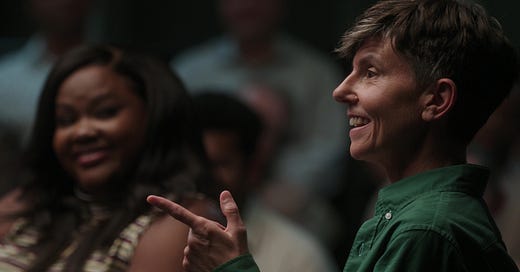Group Therapy digs deep on favorite comedians (Tribeca)
Tribeca Film Festival 2024 coverage - Documentary
I am wary when approaching most stand-up comedy. Easy laughs are often at the expense of marginalized communities, so I tend to stick with a small group of comedians who I know are funny without punching down. People who aren't afraid to confront dark topics with humor and without picking on people who already experience pain in their everyday lives. In his new documentary Group Therapy, director Neil Berkeley gathers six comedians together with Neil Patrick Harris to discuss the intersection of mental health and comedy.
All of the comedians practice a largely autobiographical style of comedy, turning their own life experiences into relatable stories that help the audience see themselves in these personal anecdotes. Mike Birbiglia said that he needs to be careful not to approach writing comedy as therapy, even though it may seem that way at times. He says that therapy is where you hope to take something of value from the therapist, but in comedy, the goal is to give something of value to the audience, and it’s essential to keep that distinction at the front of mind when working on a script.
Both Nicole Byer and London Huges explain the difficulty of being black in the entertainment industry. Nicole shares how she has encountered situations where she was directed to be “more black” for a performance, and London shares how she had few black comedy role models in London and had to move to the United States in order to develop her voice.
Gary Gulman talks about his lifetime battle with major depression and how the ups and downs of that impacted his career. Atsuko Okatsuka shared that she sometimes doesn’t feel like she deserves to go to therapy because of her mother’s intense struggles with schizophrenia. And Tig Notaro talks about having one of her most private heartbreaks filmed for public consumption.
The pacing of the film is well put together. There is the group therapy aspect, where everyone sits in a circle, sharing their struggles and processes. There are also individual segments when the comedians can do a kind of one-on-one with the camera to discuss things in further detail. In some of my favorite moments, some break into individual groups where they speak to one another as friends and colleagues.
Lest you think that all of this deep sharing is dry or overwrought, have no fear. This is a funny documentary. These are all incredibly talented comedians and there is a kind of free-wheeling attitude happening that brings a lot of levity to the documentary. But this is a heartfelt documentary, and you can expect to well up a few times.
If you are a fan of any of these comedians, Group Therapy doesn’t go a whole lot deeper than some of the material they have shared on stage or more than interviews you may have heard on NPR. But there are a few stories I was unaware of, and the context for some of them was fleshed out in a way that perhaps it had not been in the past.
Although this documentary is not particularly groundbreaking, it is a joyful movie. Even in the most dire circumstances, there is help to be found. Even when we are at our lowest, there is community to be discovered. And even when everything seems hopeless, there is humor to be shared.






